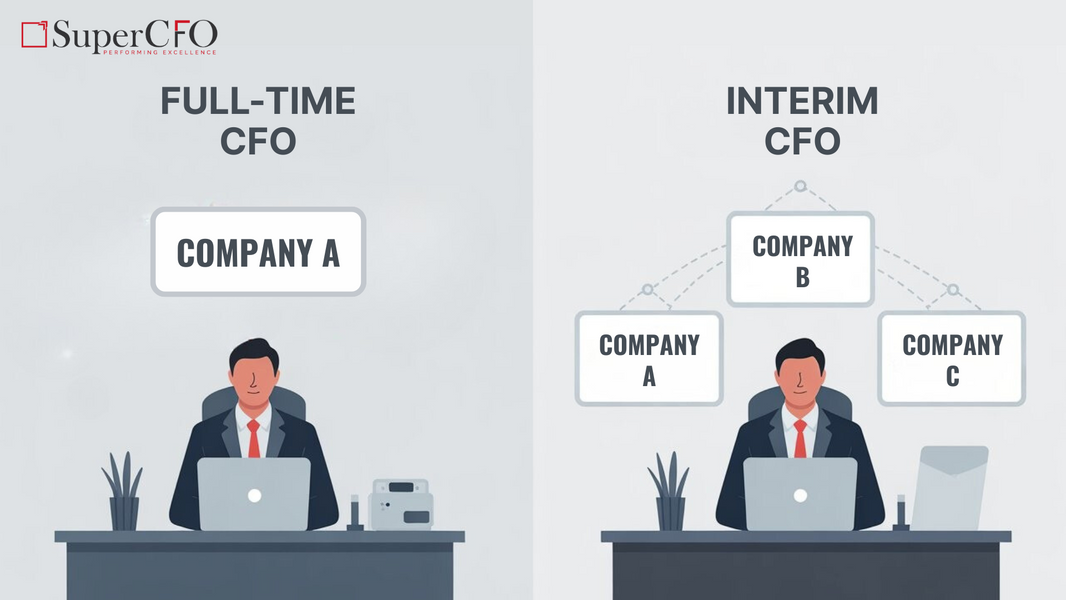Hiring the wrong CFO can cost your company more than just salary expenses. A poor choice in financial leadership can derail growth plans, damage investor relationships, and create operational chaos that takes years to recover from. For CEOs and founders, the stakes couldn't be higher when selecting the person who will guide your company's financial future.
While technical skills and experience matter, certain behavioural patterns and attitudes can signal deeper problems that may not surface until it's too late. Recognizing these warning signs during the hiring process can save your company from costly mistakes and set you up for sustainable growth.
Here are five critical red flags that should make you pause before extending that CFO offer.
1. The Job Hopper: Frequent Career Changes Every 1-1.5 Years
When you see a CFO candidate with four or five job changes over the past six to eight years, it's time to dig deeper. While career mobility isn't inherently bad, a pattern of staying at companies for only 12 to 18 months raises serious questions about commitment and staying power.
What makes this problematic for your company:
Job hoppers often struggle with long-term thinking and commitment. Building robust financial systems, establishing investor relationships, and implementing strategic initiatives all require sustained effort over multiple years. A CFO who historically moves on just as projects reach completion won't stick around to see your growth strategies through to success.
These candidates frequently leave companies during challenging periods when leadership stability matters most. If your company faces a difficult fundraising environment, cash flow challenges, or market downturns, you need a CFO who will work through problems rather than update their LinkedIn profile.
Questions to ask during interviews:
Ask for specific reasons behind each job change and look for patterns in their explanations. Request examples of long-term projects they've completed from start to finish. Most importantly, contact references from their previous employers to understand the circumstances around their departures.
Warning signs to watch for:
Be cautious if they consistently blame previous employers, give vague explanations for leaving, or can't demonstrate long-term impact in their previous roles. These patterns suggest they may not take ownership of challenges or commit to working through difficult periods.
2. The Reluctant Relocator: Accepting Remote Work While Family Stays Behind
A candidate who agrees to work in your city while their family remains in another location might seem flexible, but this arrangement often creates more problems than it solves. Whether they plan to commute weekly or work remotely most of the time, divided geography usually means divided attention.
Why this setup fails for growing companies:
The CFO role requires hands-on leadership, especially during critical growth phases. Financial crises don't wait for convenient schedules, and your CFO needs to be available for urgent decisions, emergency board meetings, and crisis management. Someone who's constantly thinking about getting home for the weekend or managing family logistics from a distance can't provide the focused leadership your company needs.
Team building also suffers when your financial leader maintains temporary living arrangements and keeps one foot out the door. Building trust and rapport with your existing team, establishing relationships with investors, and creating a strong finance culture all require consistent, physical presence and genuine commitment to your location.
Better alternatives to consider:
Look for candidates who are genuinely excited about relocating to your area or who already live locally. If you must consider remote arrangements, establish clear boundaries and expectations about availability, travel requirements, and communication protocols. However, for most companies, having your CFO physically present provides significant advantages that outweigh the convenience of remote work.
The most successful hires are often those who view relocating as an opportunity rather than a compromise, bringing their families and fully committing to your company's geographic presence.
3. The Numbers-Only Leader: Pure Accounting Mindset
A CFO who focuses solely on bookkeeping, compliance, and historical reporting might seem safe, but this approach severely limits your company's growth potential. While technical accounting skills are important, companies need strategic financial leadership that goes far beyond maintaining clean books.
What companies actually need from their CFO:
Growing companies require forward-thinking financial planning, sophisticated modeling for different growth scenarios, and strategic input on major business decisions. Your CFO should be comfortable creating investor presentations, modeling complex financing scenarios, and providing strategic recommendations based on financial analysis.
The best company CFOs act as business partners to the CEO, offering insights on market expansion, product development costs, and operational efficiency. They understand how financial decisions impact all aspects of the business and can translate complex financial concepts into actionable business strategies.
Red flags in candidates with purely accounting backgrounds:
Be wary of candidates who seem uncomfortable discussing growth planning, fundraising strategies, or forward-looking financial modeling. If they focus primarily on compliance and historical reporting during interviews, they may not have the strategic mindset your growing company needs.
Key questions to evaluate strategic thinking:
Ask about their experience with fundraising and investor relations. Request examples of strategic financial decisions they've influenced at previous companies. Understand their approach to cash flow forecasting and growth planning. Look for candidates who can discuss both the technical aspects of finance and the broader business implications of financial decisions.
4. The Budget Candidate: Accepting Low or No Salary Increases
When a CFO candidate seems eager to accept below-market compensation or shows no interest in salary growth, it might seem like a bargain for your company. However, this willingness to work for less often signals underlying problems that can cost you more in the long run.
Hidden risks of the discount approach:
Experienced, confident CFOs understand their market value and expect compensation that reflects their expertise and the value they bring to your organization. Candidates who accept significantly lower salaries may lack confidence in their abilities, have poor performance histories they're trying to overcome, or be desperate due to extended unemployment.
More importantly, a CFO who doesn't value their own worth may not command the respect needed from your team, investors, and external partners. Financial leadership requires authority and credibility, which can be undermined if others perceive your CFO as a "budget hire."
The false economy of cheap leadership:
While saving money on executive salaries might seem appealing, the cost of hiring the wrong person far exceeds the salary savings. A weak CFO can make expensive mistakes in financial planning, miss critical fundraising opportunities, or fail to build the systems your company needs to scale effectively.
Finding the right balance:
Look for candidates who have realistic salary expectations based on their experience, your company's stage, and market conditions. The best CFOs often negotiate packages that align their compensation with company performance, showing confidence in their ability to drive results while being mindful of company cash flow constraints.
5. The Technical Expert: Poor Communication and Soft Skills
A CFO candidate who excels with numbers but struggles to communicate effectively can become a major liability for growing companies. While technical expertise is essential, the inability to explain financial concepts clearly, build relationships, or present confidently to stakeholders can severely limit your company's growth potential.
What poor communication looks like in CFO candidates:
These candidates often speak in complex financial jargon that confuses rather than clarifies. They may struggle to present financial information to non-finance team members, investors, or board members in an understandable way. During interviews, they might provide technically correct answers but fail to connect their expertise to broader business implications.
You might also notice discomfort when discussing difficult topics, reluctance to engage in strategic conversations, or inability to adapt their communication style to different audiences. Some may appear nervous or unprepared when asked to explain their previous achievements or discuss challenging situations they've navigated.
Why soft skills matter more than you think:
Your CFO will regularly interact with investors, board members, bank representatives, and potential acquirers. Poor communication skills can damage these critical relationships and limit your access to funding, partnerships, and growth opportunities. Investors want CFOs who can clearly articulate financial strategies, explain complex scenarios, and demonstrate confidence in their recommendations.
Internally, a CFO with weak soft skills struggles to influence other department heads, build consensus around financial decisions, or effectively communicate budget constraints and financial priorities. This creates friction between departments and can lead to poor decision-making across the organization.
The hidden costs of poor communication:
Companies with CFOs who can't communicate effectively often face delayed decision-making, misunderstood financial strategies, and reduced credibility with external stakeholders. Important financial insights get lost in translation, and strategic opportunities may be missed because the CFO can't effectively advocate for necessary investments or changes.
Team morale within the finance function also suffers when employees can't get clear direction or feedback from their leader. This leads to higher turnover, reduced productivity, and difficulty attracting quality finance talent to your organization.
What to evaluate during the hiring process:
Pay attention to how candidates explain complex financial concepts during interviews. Ask them to present a previous project or financial analysis as if they were speaking to a non-finance audience. Observe their body language, confidence level, and ability to engage in natural conversation.
Request examples of how they've handled difficult conversations with stakeholders or team members. Look for candidates who can demonstrate emotional intelligence, conflict resolution skills, and the ability to build consensus around challenging financial decisions.
The strongest CFO candidates combine technical expertise with the ability to communicate clearly, build relationships across the organization, and represent your company professionally in all external interactions.
How to Find the Right CFO Instead
After understanding these red flags, focus on identifying candidates who demonstrate the opposite characteristics. Look for CFOs with consistent career progression that shows logical job changes every three to four years, allowing enough time to make meaningful impact at each company.
Seek candidates who balance strong technical accounting skills with strategic business thinking. The ideal CFO can discuss both detailed financial processes and high-level business strategy with equal comfort and expertise.
Prioritize candidates who are genuinely committed to your company's location and culture, whether through relocation or existing local presence. Look for evidence of team building and collaborative leadership in their previous roles.
Essential evaluation criteria:
Verify their track record through detailed reference checks with former colleagues, team members, and supervisors. Ask specific questions about their strategic contributions, leadership style, and ability to work under pressure.
Evaluate their communication skills and cultural fit through multiple interview rounds involving different team members. The right CFO should be able to connect with various stakeholders, from your technical team to potential investors.
Test their strategic thinking with case studies or scenarios relevant to your business. Present them with realistic challenges your company might face and evaluate their analytical approach and problem-solving methodology.
Making the Right Choice for Your Company's Future
Hiring a CFO is one of the most critical decisions you'll make as a CEO or founder. The right financial leader becomes a true partner in driving your company's growth, while the wrong choice can set you back years and cost far more than their salary.
These five red flags – job hopping, reluctant relocation, pure accounting mindset, discount pricing, and solo player mentality – represent patterns that consistently lead to poor outcomes for growing companies. By recognizing these warning signs early in your hiring process, you can avoid costly mistakes and focus on candidates who truly fit your company's needs.
Remember that finding the right CFO is an investment in your company's future, not just a position to fill. Take the time to thoroughly evaluate candidates, check references carefully, and prioritize long-term fit over short-term convenience or cost savings.
Finding the right CFO for your company doesn't have to be a guessing game filled with costly mistakes. SuperCFO specializes in connecting growing companies with experienced, strategic CFOs who bring both technical expertise and business acumen to your leadership team. Our rigorous screening process helps you avoid these common red flags while identifying candidates who are genuinely committed to your company's long-term success.
Our executive search process goes beyond resume screening to evaluate candidates' strategic thinking, leadership capabilities, and cultural fit with your organization. We understand the unique challenges facing growing companies and match you with CFOs who have the experience and mindset to navigate these complexities successfully.
Ready to find a CFO who will drive your company's financial future? Contact SuperCFO today to learn how our proven approach to executive search can help you identify the right financial leader for your business – one who will become a true partner in your growth journey rather than just another hire you'll need to replace.










